We see a great deal about wearable energy-generating fabrics, garments that will help keep the wearer warm, or cool, or visible because of built-in piezo-electric generators in the makeup of the fabric. Several researchers are taking this to the next level, creating new warps and woofs of materials that will create energy from a greater range of energy inputs. Elias Siores and the University of Bolton In 2011, Professor Elias Siores and associates at the University of Bolton in the UK created a flexible fiber that could harvest energy from movement and light. Siores said it was flexible enough to be woven into “a sail, window curtain or tent and generate power”. The material was recognized as a major innovation at the 2011 Energy Innovation Awards in Manchester. In a 2013 paper, the team, led by described devising a “smart fabric.” “A smart material is one that shows extraordinary response when subjected to a stimulus. Piezoelectric materials are considered as …
Recharging Technique Makes Zinc-Air Batteries a Viable Alternative
Lithium-ion and lithium-polymer batteries face several problems: they are not making great leaps forward that we hope for, they occasionally burst into flame, and they weigh too much to be all that practical in a pure-electric airplane. Researchers peer over the alternatives, magnesium, manganese, aluminum, and now, after several false starts in recent years, zinc. University of Sydney scientists claim to have found a three-stage method of charging zinc-air cells that promises greater energy density and longevity. One selling point – the relative abundance and low cost of zinc, such cells are cheaper to produce than lithium equivalents. They theoretically can store up to five times more energy than lithium-ion cells, are less prone to burst into flame, and are even more environmentally friendly. What’s not to like? Until now, they’ve been difficult to recharge. ReVolt tried developing a rechargeable zinc-air battery with an ARPA-E (Advanced Research Projects Agency – Energy) grant, but gave up after two years. Explaining that …


